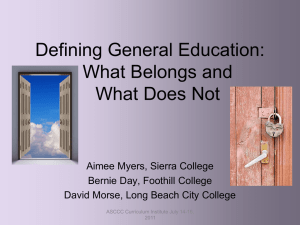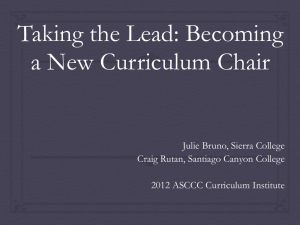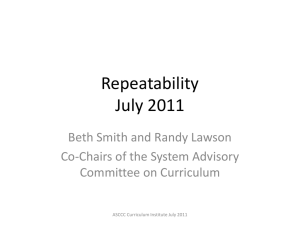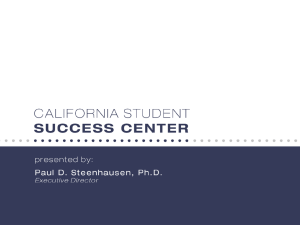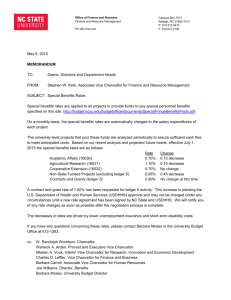August 2015 Executive Committee Minutes_Final
advertisement
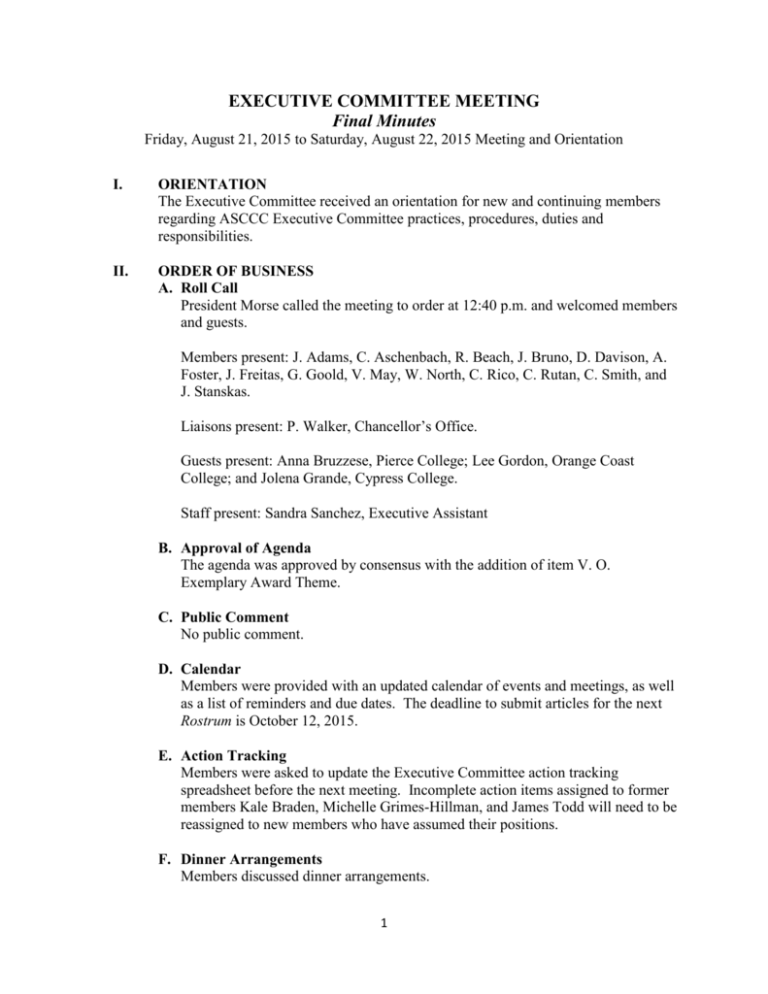
EXECUTIVE COMMITTEE MEETING Final Minutes Friday, August 21, 2015 to Saturday, August 22, 2015 Meeting and Orientation I. ORIENTATION The Executive Committee received an orientation for new and continuing members regarding ASCCC Executive Committee practices, procedures, duties and responsibilities. II. ORDER OF BUSINESS A. Roll Call President Morse called the meeting to order at 12:40 p.m. and welcomed members and guests. Members present: J. Adams, C. Aschenbach, R. Beach, J. Bruno, D. Davison, A. Foster, J. Freitas, G. Goold, V. May, W. North, C. Rico, C. Rutan, C. Smith, and J. Stanskas. Liaisons present: P. Walker, Chancellor’s Office. Guests present: Anna Bruzzese, Pierce College; Lee Gordon, Orange Coast College; and Jolena Grande, Cypress College. Staff present: Sandra Sanchez, Executive Assistant B. Approval of Agenda The agenda was approved by consensus with the addition of item V. O. Exemplary Award Theme. C. Public Comment No public comment. D. Calendar Members were provided with an updated calendar of events and meetings, as well as a list of reminders and due dates. The deadline to submit articles for the next Rostrum is October 12, 2015. E. Action Tracking Members were asked to update the Executive Committee action tracking spreadsheet before the next meeting. Incomplete action items assigned to former members Kale Braden, Michelle Grimes-Hillman, and James Todd will need to be reassigned to new members who have assumed their positions. F. Dinner Arrangements Members discussed dinner arrangements. 1 III. CONSENT CALENDAR A. May 29-31, 2015 Meeting Minutes, Stanskas B. Foundation Board Nominations, Morse C. Natural Sciences Competency Statement, Rutan D. ASCCC Standing Committee Appointments, Morse E. ASCCC Professional Development Committee Name and Charge, Rutan F. CTE Leadership Task Force, Adams Items III. D. and E. were pulled. MSC (North/Goold) to approve consent calendar as amended. Action: Item A: Staff to post the final minutes from the May meeting to the Senate website. Item B: Staff will update the Foundation website to reflect the new membership of the Board of Directors. Item C: Staff will include the Natural Science Competency Statement in the Fall Session Plenary Session resolution packet and to ICAS. Item F: Staff will update the ASCCC website with the approved charge for the new CTE Leadership Committee standing committee of the ASCCC. D. ASCCC Standing Committee Appointments This item was pulled because some committees are still seeking appointments. It was suggested that Morse confirm remaining committee appointments. MSC (Rutan/Aschenbach) to approve the current list of membership and delegate Morse, in collaboration with the Vice President and Executive Director, to finalize the ASCCC Standing committee appointments as recommended by the committee chairs. By consensus, an updated ASCCC Standing Committee appointments list will return to the September Executive Committee agenda on the consent calendar. Action: Morse to work with the Vice President, Executive Director, and committee chairs to finalize additional committee appointments. E. ASCCC Professional Development Committee Name and Charge This item was pulled to discuss concern raised regarding the replacement of the word “professional” with “faculty” in the committee’s name and charge. It was suggested that the charge should emphasize the importance of professional development, which was not accomplished by the insertion of faculty development. The Executive Committee discussed the charge and suggested other modifications. By consensus, Adams, Davison, and Rutan will work on revised language. 2 MSC (Davison/Goold) to adopt the committee charge as amended. Action: Adams to update the committee’s revised name and charge on the Senate website. IV. REPORTS A. President’s/Executive Director’s Report President Morse began by welcoming the newest members of the Executive Committee. He then updated members on a recent Chancellor’s Office Equal Employment Opportunity (EEO) and Diversity meeting where they discussed funding distributions. Notes on this discussion will be shared with the Consultation Council and a proposal will be considered for first reading in November. The EEO will be holding two summits on hiring and diversifying faculty. The northern summit will take place on November 2 and the southern summit on November 4. Morse informed members of his upcoming local senate visits at College of the Desert and Golden West College. He reported on discussions concerning the 2015-16 Budget and explained that this year’s focus will be on the need for professional development. Morse updated members on three new appointments to the California Open Education Resource Council (Ca-OERC) under ICAS – Cheryl Aschenbach, Dolores Davison, and Dan Crump. He is hopeful that these additions will strengthen the connection between Ca-OERC and the Executive Committee. Morse notified members that the new Accreditation Task Force has been finalized, which will be shared with constituents soon and presented to the Board of Governors in September. The charge of the task force was to make recommendations to the Board of Governors regarding possible changes or improvements to the accreditation for the California Community College System. Morse presented his interest in facilitating the discussion around fiscal regulation and the 50% Law. He noted that these areas have deep structural issues for all constituent groups and suggested that these issues need to be evaluated in a systematic manner through a representative task force. The Chancellor has authorized the development of a Consultation Council task force on the 50% law this fall. Morse concluded with an update on recent conversations with UC regarding transfer. UC has developed nine undergraduate prep patterns and would like to know more about how they can incorporate C-ID. The ASCCC leadership has arranged to present to the UC Council on C-ID and alignment with the transfer pathways. 3 Adams updated members of the status of the Professional Development College Curriculum module. It is anticipated that the module will be launched this fall and consists of five modules that will be certifiable by the Senate. Adams informed members that work is being done to transition the C-ID operations to Mt. SAC. The curriculum responsibilities will remain with the ASCCC under the leadership of the C-ID Curriculum Director. She explained that the Chancellor’s Office is seeking more funding to undertake C-ID for CTE courses, certificates, programs, and model curriculum. She is hopeful that the funding will be resolved by November. Adams provided an updated members on operational issues including an upcoming audit and hiring of staff members. B. Foundation President’s Report No report was provided. As approved by the Executive Committee, May will assume the role of Foundation President effective immediately and provide updates at future meetings. C. Liaison Oral Reports No reports were provided. For the knowledge of new members, President Morse reviewed the role of each of the organizations (AAUP, CCA, CCCI, CFT, FACCC, and CPFA) that are invited to provide the Executive Committee with an update. V. ACTION ITEMS A. Legislative Update Members discussed AB 968 (Williams, July 18, 2015) Transcripts: Expulsion Note, which requires the governing board of each community college district to indicate on a student’s transcript when the student is ineligible to reenroll due to suspension or expulsion for the period of time the student is ineligible to reenroll. A few members were concerned that the notation would brand students for reasons other than academic, thus altering the integrity of an academic transcript. It was suggested that the Executive Committee oppose the bill and write a letter of opposition. MSC (Stanskas/Foster) to oppose the AB 968 (as of July 18, 2015) and send a letter of opposition with the ASCCC concerns. Action: Executive Committee members will send the president concerns and comments to inform the opposition letter. Using comments/concerns provided by the Executive Committee, President Morse will send a letter of opposition for AB 968. 4 B. Effective Practices in Accreditation Paper The Executive Committee discussed forwarding the Effective Practices in Accreditation paper to the 2015 Fall Plenary Session for discussion and debate. We talked about links, but were concerned that they change every year and concluded that a link to the main ACCJC website was sufficient. MSC (Aschenbach/Bruno) to approve forwarding the Accreditation paper to the delegates at the 2015 Fall Plenary Session for discussion and debate. C. Workforce Taskforce Update and Direction On July 29, 2015, the Board of Governors Taskforce on Workforce, Job Creation and a Strong Economy concluded its work by endorsing 23 recommendations designed to enhance career technical education in the California Community College system. Members were informed that the report from the taskforce will be presented in town hall meetings on August 25 and 27, announced through the Consultation Council on September 10 before going to the Board of Governors for a first reading in September. The ASCCC will hold CTE regional meetings in October to gather feedback. The second reading of the task force recommendations will be presented for final approval at the Board of Governors meeting in November at Mt. San Antonio College. Executive Committee members were asked to review the report with their committees and to bring any questions or concerns to the Executive Committee at its next meeting when implementation will be discussed. D. Recommendations and Feedback of the Bachelor’s Degree Task Force Members were updated on the progress of the ASCCC Bachelor Degree Task Force. The task force met in April 2015 and devised a set of recommendations for the bachelor’s degrees offered by the California community colleges. Since then, the task force discussed recommendations with representatives from the field at large and are now seeking direction from the Executive Committee. The task force recommended that the CCC bachelor’s degrees should consist of at least 120 units. Members discussed this recommendation which included feedback from the field. The task force noted that the recommendation on general education received the most attention. This recommendation would require 43 to 45 semester units of the degree to be general education. In conversations with the pilot colleges, representatives are concerned with the loss of local degree autonomy and the number of units outside the field of study. The task force will meet in September to develop draft recommendations to bring to the September Executive Committee meeting for consideration. MSC (Smith/Freitas) to support recommendations from the Bachelor’s Degree Task Force. 5 E. Bachelor’s Degrees The Executive Committee discussed an exploration of future strategies for oversight of the bachelor’s degree. The 15 pilots approved by the Board of Governors have begun developing their degrees including the curriculum development. The ASCCC task force has participated in conversations with the pilot colleges to understand their challenges while assisting them with understanding the faculty responsibilities for specific degree requirements such as minimum qualifications, general education, and other topics that fit within the purview of faculty and their responsibility for academic and professional matters. The Chancellor’s Office recognizes the role of faculty in the development of Bachelor’s degrees and has requested that the ASCCC consider a structure that might be helpful in managing and shaping a CCC Bachelor degree. By consensus Vice Chancellor Walker and Bachelor Degree Task Force chair will work together to ensure the effective implementation of the Bachelor Degree for CCC. F. Committee Priorities The ASCCC Standing Committee Chairs highlighted resolutions priorities for each committee, particularly how the resolutions relate to the ASCCC adopted Strategic Plan. Chairs were encouraged to share the priorities with their committee members for further feedback. By consensus, committee chairs will bring forward any changes to the Executive Committee for consideration at the next meeting. MSC (Rico/ Stanskas) to approve the priorities for the ASCCC Standing Committees. G. Fall Plenary Theme Members discussed the timelines for the Fall Plenary Session and were asked to consult with their committees and propose breakout topics for consideration at the September meeting. Members then discussed possible themes and keynote speakers. The committee agreed on Converging Inspiration, Innovation, and Action as the Fall Plenary Session theme. MSC (Goold/Rutan) to approve “Converging Inspiration, Innovation, and Action” as the theme for the 2015 Fall Plenary Session. H. 2015 – 2016 Budget Members were presented with an overview of the ASCCC budget process for the benefit of the newly appointed members that included a discussion of the budget basics. The Officers recommendation included in this agenda item and reflected in the 2015-16 Budget were presented. MSC (Goold/Aschenbach) to approve the recommendations of the officers regarding the 2015-16 Budget as submitted. 6 Action: The budget will be included in the ASCCC Livebinder for the Executive Committee future reference. I. Regional Meetings Standards and Guidelines The Executive Committee discussed the standards and guidelines for the regional meetings including how to reduce the “no shows” at the events and the ultimate waste of resources because of these “no shows”. By consensus member agreed to charging a small fee for individuals who register for the meetings but do not show up. MSC (Freitas/Davison) to approve the regional meeting standards and guidelines as amended. Action: Adams will revise the standards and guidelines to include a no-show fee and post on the website. J. Regional Meeting Dates, Freitas/Adams The Executive Committee discussed the dates for the fall regional meetings. MSC (Foster/North) to approve the November 13 &14 meeting dates for the Curriculum Committee and the October 9, 10, 16, & 17 meeting dates for the CTE Leadership Committee. Action The committee chair will submit a draft agenda for the regional meetings for the September agenda. K. Instructional Design and Innovation Institute Members discussed event location, dates, program, call for proposals, and other relevant topics for this event including which ASCCC committees should be involved in the program development and possible breakout categories. In discussing the program development, members suggested a number of possible categories including collaborative efforts, innovation in the classroom, institutional innovation, innovations impacting student equity, and many more. By consensus, Adams will work with others to develop a call for nominations which captures this discussion of the possible topics. A revised call will be included on the September agenda. Members requested that the advertisement of this institute be sent out as soon as possible as many colleges are already scheduling professional development. Action: Adams will develop an email message to promote all upcoming ASCCC events. 7 This item will return to the September meeting for consideration and possible approval. L. Supplement for Curriculum Committee Regional Survey This item was pulled and will be presented at a future meeting when further discussions can be had with the newly appointed Curriculum Committee. M. Student Support for Disenfranchised Students Survey In Fall 2014, delegates passed Resolution 20.01 Developing a System Plan for Serving Disenfranchised Students called for us to “work with the Chancellor’s Office and the Board of Governors to develop a long range plan that will increase services for disenfranchised students.” There is little or no data on how colleges are addressing emotional and/or environmental issues that may hinder the success of disenfranchised students in the California Community College System. These issues include but are not limited to mental illness, homelessness, and/or unstable income. In support of the efforts outlined in Resolution 20.01, the Transfer, Articulation, and Student Service Committee (TASSC) would like to first collect data and learn more about “wrap around” services that are currently offered by distributing the proposed survey to the counseling departments at each of the community colleges. MSC (Smith/North) to approve the distribution of the survey on Support Services for Disenfranchised Students. Action: TASSC will distribute the survey in early September 2015. N. Caucus Recognition for the ASCCC LGBT Caucus, Stanskas In May, the Executive Committee tabled the item for recognition of the LGBT Caucus until Stanskas could reach out to previous caucus members to determine if there is a collective interest to continue the caucus. The Executive Committee discussed the caucus and its membership to ensure the caucus met the requirements to be an ASCCC Caucus based on the adopted guidelines. MSC (Goold/Beach) to approve the continuation of the ASCCC LGBT Caucus. Action: Staff will update the ASCCC website to reflect this action. O. Exemplary Award Theme The Executive Committee discussed the theme for the Exemplary Award and the importance of selecting a theme that will resonate with Board of Governors and their priorities. 8 MSC (North/Goold) to approve the theme Contextualized Teaching & Learning for the 2015-16 Exemplary Award. Action The Exemplary Award application will be updated, posted on the website, and included in the emailing of the application. VI. DISCUSSION A. Chancellor’s Office Liaison Report Vice Chancellor Walker provided a Chancellor’s Office update and covered the following topics: ADTs: There are currently 1917 active ADTs and the deadline to submit is August 31. There are about 20 colleges that are 1 or 2 programs away. The Chancellor’s Office is working closely with a few colleges to help them reach a resolution. Governet/CurricUNET: Walker explained that the CIOs have asked the Chancellor’s Office to reevaluate CurricUNET. It has been the source of many issues in the development of ADTs and the queue is quite large. In an effort to resolve this, the Chancellor’s Office has been working with the CCC Technology Center at Butte College an inventory of dialogue. Basic Skills: Basic Skills has allocated $20 million. The Department of Finance has also allocated another $60 million for Basic Skills, as well as $10 million to facilitate Basic Skills conversations between CSU and the Department of Education (CDE). The Chancellor’s Office will present on Basic Skills at the Board of Governors retreat in September. The money is specifically for contextualized learning, best practices replication and scaling, and needs to show progress in the area of basic skills completion. Inmate Education Pilot Program: Snowden has been talking with the legislature about Senate Bill 1391 (Hancock). There is potentially a 3:1 match from the Ford Foundation. Inmate Education is on the Governor’s agenda. The Chancellor’s Office is reorganizing. Walker will oversee Educational Services, which includes Student Services and Economic Development. Vice Chancellor Skinner, Vice Chancellor Stewart, and Vice Chancellor Tena will undergo changes in their positions as well. Chancellor Harris is interested in incorporating a different set of influences, so Walker and Vice Chancellor Nolden are developing a Dean of Educational Services position. All of these changes will be reflected as they happen. Additionally, Dean McCullough retired from her position as Dean of Curriculum and Instruction. Dean Escajeda has accepted the interim position. B. Board of Governors and Consultation Council Update President Morse explained the role of the Consultation Council for new members and updated the committee on the major topics discussed at recent meetings. The focus of the June meeting was the budget and consultation; The July meeting was centered on the WFTF and legislation. 9 C. Educational Planning Initiative Update Members were presented with a video on the Hobsons software product STARFISH—Early Alert System and discussed the helpful features for faculty. D. C-ID and TMC Update A written report was provided in the agenda. Sections of the report were highlighted and briefly discussed. E. Institutional Effectiveness Partnership Initiative (IEPI) Update IEPI was awarded $12 million in the last budget partially to support the dissemination of effective practices. This item will be discussed in detail at a future meeting. VII. REPORTS A. Standing Committee Minutes B. Liaison Reports 1. Accrediting Commission for Community and Junior Colleges (ACCJC), Beach 2. Chancellor’s Office General Education Advisory Committee (GEAC), Stanskas C. Senate Grant and Project Reports 1. C-ID, Bruno 2. SCP, Adams VIII. ADJOURNMENT The Executive Committee meeting was adjourned at 1:00 p.m. Respectfully submitted by Julie Adams, Executive Director Sandra Sanchez, Executive Assistant John Stanskas, Secretary 10
